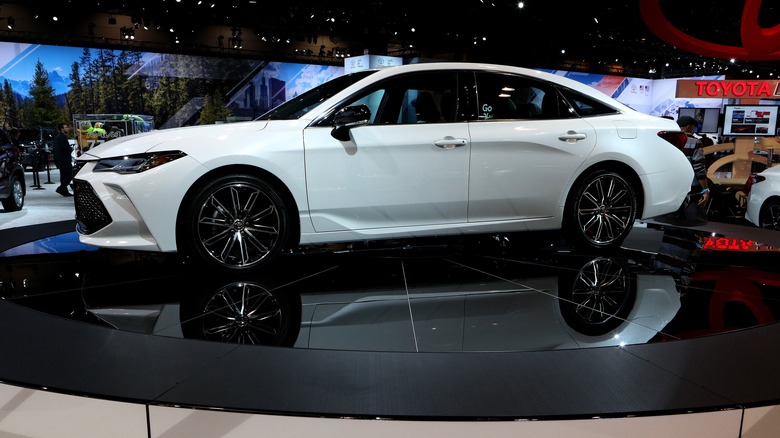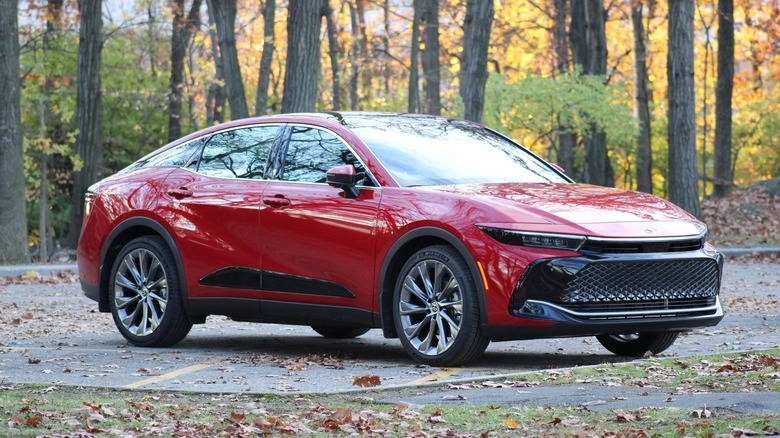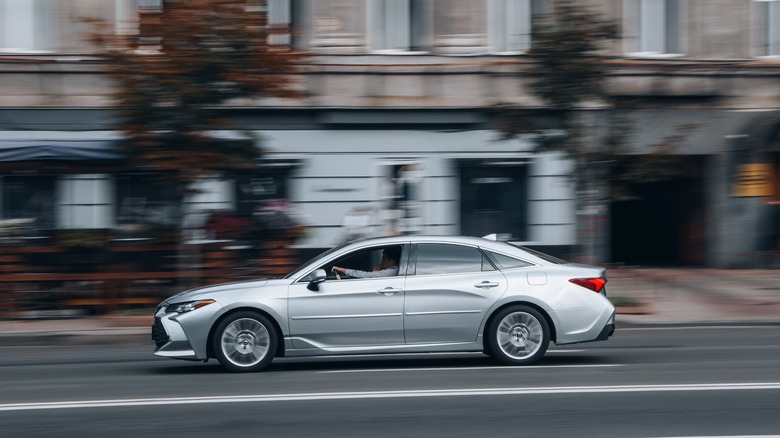Here's Why Toyota Discontinued The Avalon
When Toyota debuted the Avalon in the mid-90s, the vehicle not only became the manufacturer's first legit full-size Sedan but also its first automobile to be produced entirely in the U.S., originating from the company's Kentucky manufacturing plant. Boasting a sleek design, spacious interior, powerful engine, and elegant features, The Avalon marked a significant upgrade over Toyota's more basic mid-size Camry and quickly began to rival its predecessor on the sales front.
That trend continued for much of The Avalon's almost 3-decades-long production run, with the vehicle being seen by many as a more cost-friendly option to the Sedans made for Toyota's posher luxury brand, Lexus. Given its longevity and legacy, it came as a surprise to many in the automobile industry when Toyota announced the 2022 fifth generation model would be Avalon's last, with the company ceasing production altogether prior to 2023.
It's been a couple of years since the final Toyota Avalon rolled off the assembly line in Georgetown, Kentucky, and questions still abound regarding why the once-beloved Sedan was removed from the manufacturer's production slate. Here's why Toyota decided to discontinue production of the Avalon.
Toyota phased out the Avalon to make room for the Crown
While Toyota's announcement to phase out The Avalon might've come as a surprise to some, it was accompanied by the news that the Japanese manufacturer was essentially replacing its long time full-size offering with another, perhaps flashier large sedan, the Crown. As it happens, the Crown was hardly a brand-new model in the Toyota line up, with the automaker first introducing the vehicle to consumers in the mid-1950s. The manufacturer has had some version of the Crown in its line up ever since.
Of course, the Crown nameplate was new to American consumers in 2023, with Toyota largely opting to sell the model only in Asian and some European markets throughout its six decades in production. But even those markets familiar with the long-tenured Crown may have had trouble recognizing the vehicle ahead of its '23 global debut, with the company giving the vehicle's exterior a sleek, high-riding re-design before it entered the full-size sedan market.
The Crown got a re-design under the hood as well, with all three versions of the vehicle boasting hybrid technology and disparate engine builds capable of producing anywhere from roughly 240 to 340 horsepower. Oddly enough, despite the engine's boasting Toyota's hybrid tech, the Crown's fuel economy reportedly registered below that of the Avalon hybrid. Anomaly aside, given the stylish design and various upgrades, the Crown feels like a worthy successor that impressed even our own SlashGear reviewer.
Flagging sales also doomed the Toyota Avalon
While Toyota made clear that bringing the re-imagined Crown to the sedan-loving masses was a major factor in discontinuing production of the Avalon, it's safe to assume the automaker would not have pulled the plug on the car had it been flying off the sales floor. Indeed, it seems flagging sales contributed to Toyota's decision to end production of the Avalon, with the overall numbers reportedly declining steadily in the years leading up to 2022.
The decline in sales was likely not a reflection of the Avalon's quality, or its esteem on the large sedan scene. Even if some couldn't help but note that the car hadn't received a full-on upgrade for years ahead of its retirement apart from its welcome Nightshade treatment in 2022. Perhaps more damning to the Avalon's sales numbers is that American consumers have largely been fleeing the large sedan market in recent years, opting instead to spend their money on SUVs of various makes and sizes.
It remains to be seen if the Crown SUV-ish build will help Toyota reclaim any market share in the large sedan realm over the long run, or if it will struggle to sell in a similar vein as the Avalon. While the vehicle appears to have sold well-enough in 2023, if the numbers are accurate it still sold well below both the Toyota Camry and the Toyota Corolla. For now, it seems Toyota is happy to keep the Crown on the road and see what happens.


